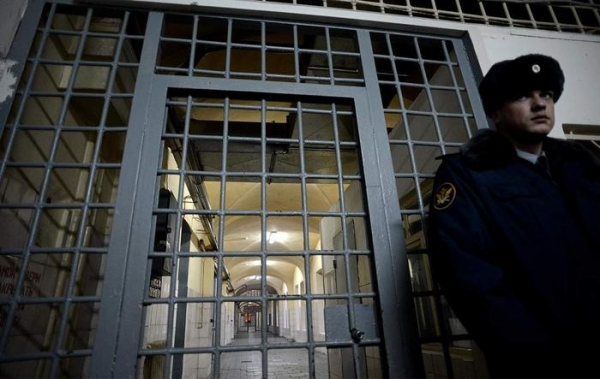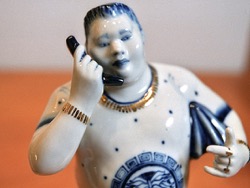
Linguist Ksenia Knorre-Dmitriev on the Russian language after perestroika
“Ribbon.ru” continues a series of interviews about the recent past of our country. Following the restructuring, we recall the key events and phenomena of the 90’s- the era of Boris Yeltsin. The author of scientific works on linguisitic, researcher jargon and the language of advertising Ksenia Knorre-Dmitriev said “the Tape.ru”, how the changes in society, reflected in language, where did the “Caucasians” and why everyone is forced to know what is “roof”.
“Ribbon.news”: What do you remember about the language of the 90s, what processes in language happened then?
Knorre-Dmitriev: the Most characteristic feature of the language of the 90s — a mixture of styles. The Soviet language was rigidly codified (specific styles meant for different situations of communication: journalistic style, colloquial and scientific almost do not overlap) even with the 20-ies, when the new country faced the necessity to create a common language for different strata of the population. By 1956, the Russian language has already been established, ossified, and began to accumulate a voltage for language change played a lesser role than rebuilding.
What happened in the language, for example, press once the USSR ceased to exist?
First, the possibility of public statements became those who had no such opportunity was taken, that is, spoken language became the speech of Newspapers. Secondly, dry codified the Soviet language has suddenly changed into its opposite. Happened to him about what our life: for many years we have almost nothing, and suddenly something appeared. Just as we began to buy things, clothes, dishes, furniture and so on, we dragged in the language of all the bright, beautiful, catchy — everything that helped our emotionality, expressiveness.
For me the symbol of that stylistic mess — the name of the newspaper “Kommersant-Daily”, which looked absolutely incredible. In addition, the language included a huge number of loanwords. This was due both to the fact that in our life there was a lot of objects and phenomena, untitled (cappuccino, office, realtor, franchise) and with the formation of the speech of certain social groups, where knowledge of English was necessary.
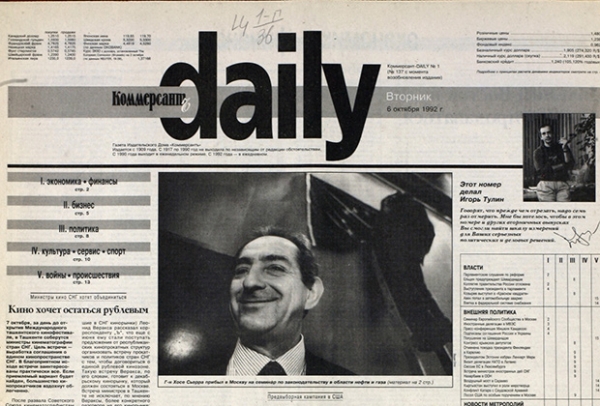
Reproduction of the front page of one of the first issues of the newspaper “Kommersant-Daily” 1992
Photo: Dmitry Lebedev / Kommersant
Whatís new language of television and radio?
TV gave us the opportunity not only to get acquainted with new words, but also coined combinations modelled after expression and intonation. For example, “stay tuned”, “go to commercial”, “commercial break”, the treatment of each other host in the Studio and outside with the ascending intonation: “Anna?” “Dimitri?”
Another issue of television influence in that spoken language came on the air. If before the program were mainly in writing (and in those that broadcast directly leading read in advance prepared text), now with the screens it sounded unscripted, unedited, is the same as in the kitchen, in the subway, the Smoking room. This was especially true, of course, radio, where every station if specially looked for leading with informal speech.
Besides being one of the main tasks of the 90s was to be different from others, the media in those years became acquainted with the phenomenon of competition. Therefore, the program has struggled for viewers and tried to stand out by any means, including language.
For example, it was very difficult to break away from Alexander Nevzorov program “600 seconds” he is very alive and figurative language described their spooky stories, then still unusual for national television. By the way, at the same time arise in the language of the word “Chernukha”, “bytovuha”, “dismemberment”, emphasizing a certain earthiness, a regularity of the happening. Until the 90s, this was typical only for the language police, that is purely professional has become widespread.
Where else in the language came new words?
In new words there are two sources. External flow — from other languages, and internal — the words that were already in our language, but used closed social groups: criminal, military, youth, etc. When talking about the language of the 90’s, I remember the first bawdy words (“throw”, “collide”, “roof”, “grandmother”, “racket”, etc.). Thanks to the advent of the press and speech of the politicians they have suddenly become available to all.
By the way, interesting observation: educated people used these words (e.g., “thrown”) in the framework of the language game and thereby legitimized them. For myself I know that if two times to say “in the area” as a joke, the third time it happens automatically. In General, language play has been an important language element 90. New phenomena of life interpreted in an ironic key, words, which are now no longer in use: “katastroika”, “hydronamic”, “grabbing”.
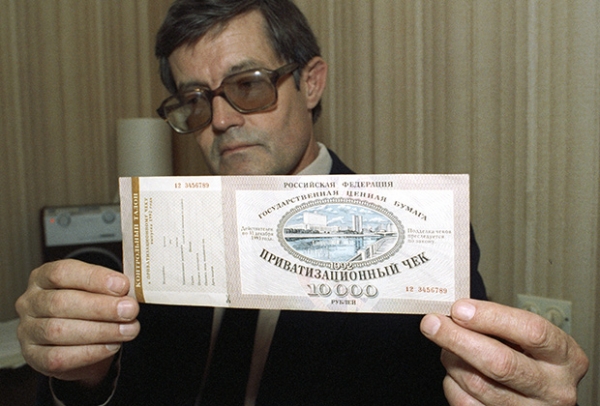
Privatisation voucher (voucher). 1992
Photos: Igor Mikhalev / RIA Novosti
These words can be called phrases of the era?
Though the key is still “privatization” and “vouchers”. But this question will likely be different answers depending on whom you ask. All survived the 90’s in different ways, for someone-the key is the word “hitting”, for some “Shuttle”. For me, probably due to age, the key word of the time — returning to the language of “high school”.
Does the word “voucher” to the 90’s in the language was not?
It was there, but had different meaning. It is, like “high school”, illustrated another important process: up to the 90s in the language had numerous words that were not related or to our country or to our time. “The Duma”, Kommersant, “liberal”, “Parliament”, “the Cossacks”, “the village” — it was all either from theory or from history. Words like “exchange”, “Beau Monde” is also not treated of our lives, and suddenly they came to us.
Not all are accustomed — some, no matter how trying, never entered everyday speech, such as “sir” and “Madam”. In the 90s we lost the word “comrade”, but did not find him an adequate replacement. K-treatment “female” and “male,” but at the word “sir” the man actually shuddered. Same with “master” — of some this treatment simply insulted.
Back in the 90’s is back vocabulary connected with the charity, came into use religious vocabulary — the names of the prayers, holidays, parts of vestments, ceremonies, temples began to be used, and in everyday speech, and language media.
What is the language of Newspapers and television, spread the new language?
The development of publishing and the decline of quality book production. Poor editing resulted in a loosening of grammar, punctuation and phraseological norms. In the 90s ceased to be ashamed of illiteracy.
How influenced the modern language of the General decrease in the level of language culture in the 90s?
There is such a thing as language taste, which is formed on the basis of books read, due to cultural communication with native speakers through TV programs. In the 90s generation has grown up children, talked about “lost”. There is a certain element of truth — including and from the point of view of formation of their language and culture.
Traditionally, “lost” is explained by the fact that the parents had no time for children, because they were engaged in survival, but the problems with the formation of linguistic taste, I would explain this unprecedented mix of styles, the flow of new vocabulary, the advent of oral speech in the media.
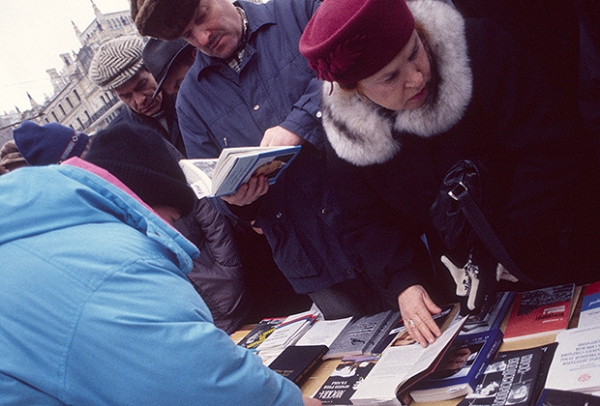
Unclassified. 1990-ies
Photo: “Light” / “Kommersant”
The current language environment largely dominated by people who grew up in the 90s, and what happens in it now, I think, is to blame for their immature language taste. Otherwise it’s hard for me to explain so often and in a variety of communicative situations used words like “yummy”, “restik”, “devchulya”, “chicanos”, “lave”. Of course, taste is a subjective thing, but there is also the concept of “gaudy dress” when everyone around understands what it is about. Similarly, I believe it’s tasteless to speak.
And “damn” from the 90s?
This word has appeared as a euphemism in the jargon of youth, in the 90s entered the language and was often used. For many, it was irritated more than the equivalent of obscene, which was replaced. Euphemisms were before, for example, in the film “Love and pigeons” the main character kept repeating “Holy crap”. It is also a euphemism, as, for example, “Japanese policeman”, but, of course, with the popularity of “pancake” nothing compares.
What interesting happened in that time in the language of politicians?
Each of our leaders had some kind of speech feature included in the jokes: if you say “very important”, “start”, “Kuz’kina mother”, pronounce something with a Georgian accent or smacking, immediately clear, he was talking about. In the 90s, Boris Yeltsin had “understand”, “squiggle”, “shta”. That is, its language had individual characteristics, but in General, Yeltsin has preserved the speech of the Secretary of the Sverdlovsk regional Committee, except that less formal than its predecessors.
But the language of Vladimir Putin much more interesting. First, Putin led the country at a younger age than his predecessors, and secondly, he was the first who came not from the party “forge”, and thirdly, he knows how well and professionally speaking, skillfully using rhetorical techniques.
One of them, the most famous is the conscious reduction when in the middle of stylistically neutral text, suddenly there is the famous “soak in the toilet”, “chew snot” and so on. Therefore, in my opinion, the main difference between the speech of Vladimir Putin from his predecessors is that he obviously consciously does all these inserts, as the Soviet leaders talked as best they could.
In politics as in society, language liberalizirovat, demokratisierung, in Parliament sounded conversational speech. In the 90s came into power people with criminal background, came Viktor Chernomyrdin, who, though not formed of some directions in political speech, remain very bright. His “Chernomyrdin” (“wanted as better, and it turned out as always”, “never such was and here again”) became the national language and in collections of anecdotes.
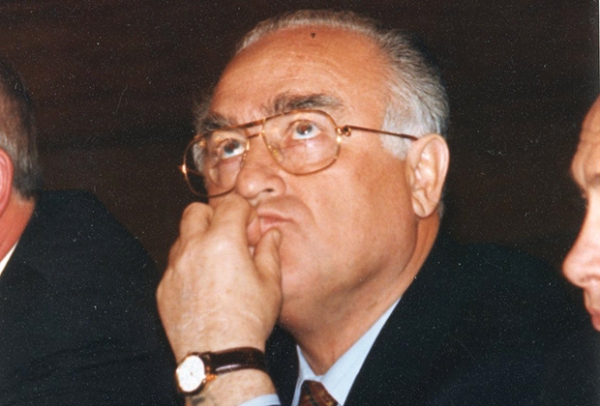
Viktor Chernomyrdin, 1990-ies
Photo: “Light” / “Kommersant”
And who have shaped the course of political speech?
Definitely Putin. Copy speech Chernomyrdin was impossible with so much talent, in my opinion, it is necessary to be born, it was improvisation. And Putin has his famous stylistic reduction were clearly homemade consciously used the blanks, and it began to copy.
The tip always tried to imitate their leader: manner of dress, gait, language of the officials said “to mean” under Khrushchev, “comunisim” under Brezhnev, “start” and “accept” under Gorbachev.
Surprising Dmitry Medvedev has tried to use the sudden decline of the style, which is Putin looks quite organically, and said “stop scaring business”, but it didn’t work, looked unnatural.
Even in the speech plan very bright, of course, Vladimir Zhirinovsky. His remarks (“We will wash boots in Indian ocean”, “Definitely!”, “Bastards!”) still remember.
Offensive names of the nationalities (“hachi”, “chocks”, “EBUSY” and the like) emerged in the 90s after the separation of the Union republics or have been circulated before?
Most likely, they came into the language from military and criminal jargon, where belonging to a certain nationality has always played a special role. In the army of Uzbeks was called “apricots”, Dagestan — “the Dougie,” and so forth. First, it is because in the army all always know who is which nationality, but in everyday life few people can distinguish from Dagestan Ingush. Secondly, in such close-knit communities groups are often formed on the principle of community.
But what really gave the 90 is the expression “person of Caucasian nationality”. It was borrowed by Newspapers in the late 80s from the language of police reports, and in the language of employees of the interior Ministry, in turn, appeared in 80-ies in connection with the increase of crimes committed by ethnic groups.
Earlier, in the 20-ies of the twentieth century, the protocols can be found the “people of Jewish origin” (which, of course, correct, because the Jewish nationality in contrast to the Caucasian exists), and a new expression has arisen on this basis.
What else then came into the language from military jargon? “Push-UPS”?
The phrase “push-UPS” were traditionally attributed to Alexander Swan, but actually it was an improvisation of the actor Sergei Bezrukov, voicing a doll of a Swan in the program “Dolls”. I refined the Victor Shenderovich, was it not that phrase in his original scenario, but he indicated in unambiguous authorship Bezrukov. As you remember, this phrase became famous, the General of the Swan even took her on Board before the election.
“World of leather and fur”, “world of tiles”, “sanitary ware universe” — these and similar structures belong to the 90s?
Yes, we then accelerated mastered the basics of small business, and it was, of course, attempts to distinguish themselves from homogeneous medium, point out your uniqueness and competitive advantages. It is interesting that globalization is then largely concerned the meaning of the words.
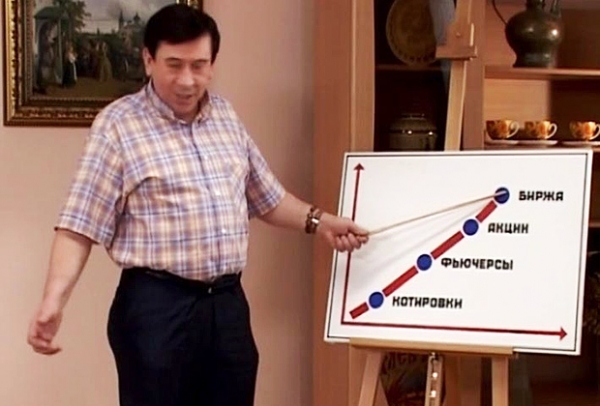
Frame: YouTube video
Take the “elite” and “exclusive”, included in the promotional language of the time: before exclusive could be an interview in the newspaper, and the elite — bulls-sementelli. In the 90’s and exclusive luxury steel Windows, toilets, jackets and so on. To denote the superior qualities of the product was used all the possible ways.
Advertising, of course, did much to destabilize linguistic traditions. When the advertisement one and the same action is repeated without end, it zamylivaetsya and stops working, we must go further, including the overcoming of language taboos, it is necessary to attach, to shock, to tell you.
At the beginning of the two thousandth spread advertising, which caused a storm of indignation: “really izzaty magazine” or “Euroset, Euroset, the prices simply Oh…”, as well as various “snikersni”. But it is an interdependent process. Advertising, day and night, sounded from the screens and hanging on the streets did influence our verbal behaviour, but such language advertising would not have been possible without all those processes taking place in language in the 90-ies, of which we have spoken.
Unfortunately, I often have a hard time remembering favorite lines from Pushkin, Tsvetaeva, lacking faith, but I still remember a series of advertising slogans of the 90s: “I’m not a Freeloader, I am a partner”, “buy his wife boots”, “is not simple, and very easy”, “take a break — eat a Twix”, “before the first stars cannot wait-a”, “life is good when you drink slowly”. They were frequently quoted in a variety of situations, taking in an equal position with books and movies. Before the 90s, this material just wasn’t there. And the most active carriers of this infection were children, who knew by heart all television advertising.
All the “Chicks”, “Chicks”, that is derogatory treatment of women, also from the 90s?
Dismissive attitude to women has always been accepted in certain groups. For example, the hippies, where relationships between men and women were emphasized simplified, women were called “skanks.” “Chicks” came from the criminal world (although some dictionaries mark this word as the slang of youth), where women too were made to treat fairly utilitarian.
The word “chick” (“shiksa”) — from criminal slang and popularized it in the language of a group of “Bachelor party”: “We met a chick, she was good.” Many were irritated not only that there was a lot of new vocabulary, but what you inevitably begin to understand, as if taking in its language.
“Bachelor party” you already remembered what else came in the language of the popular songs of that time?
At the time, sang in the vernacular that it was impossible for the Soviet stage. In the songs there was a language game and the utmost disregard for the rules, take the classic “two kusocheka sausages”. They were quoted, was used in headlines, in speeches. If you listen to the songs of group “the Combination”, “Kar-man”, “lube”, you will notice that they have all at once: internal and external borrowing, mixing languages.
Typical Soviet was lost in the 90s?
Left vocabulary relating to politics and life. Went “shopping bag”, current at the time of the shortage, the verb “threw”, “get it” almost gone “thrift shop”. We hear a lot about the corruption of language in the 90-ies, but many of the words already, just climbed out, had ceased to belong to a narrow social groups.
There were groups — the same hippies or black-marketeers, through the word inserts the English words. For example, in a remarkable novel “Nowhere with love” Dmitry Savitsky, written in 70-e years, the author quotes the language of black marketeers: “Dude, how do you shoes signout! Class, man, formidable! We negotiate? Promezhdu-Apropo: there bytovye Trouser in blakeway strapback”. The language of the black marketeers also partially included in a speech in the 90-ies.
But many words of the 90’s also lived and today is no longer used. For example, quite dead “lump”, rarely used “hook” and “pipe” as in “phone” (though in Petersburg it is possible to hear “tube”), less likely to mention “roof”. Or left phenomenon, or the words were in some language superseded by other reasons.
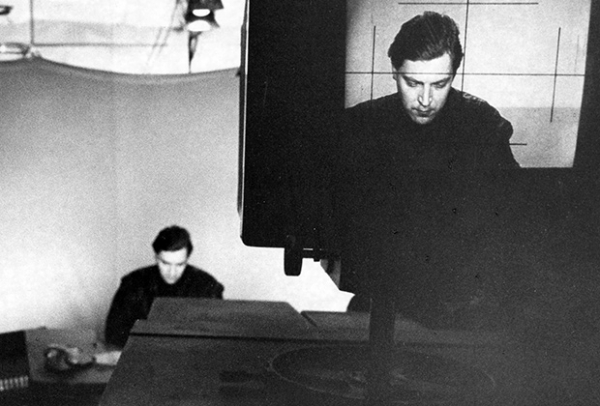
TV presenter Alexander Nevzorov during the shooting of the program “600 seconds”. 1992
Photo: Oleksandr Tymoshenko / Kommersant
In General, how would you characterize what happened with the language in the 90?
Largely it was a time of linguistic chaos. There was an explosion in society, reflected in the language, and after him flew in all directions the fragments. The era of 90s is characterized by the juxtaposition of events that did not already comprehend. In addition, our lives became a lot of new phenomena and objects: computers, Internet, election campaign advertising. All came together, and it was a real language compote.
In linguistics there are always conservatives and those who are relatively comfortable with such changes. I have a similar position with Maxim Krongauz who has nothing against the language of freedom, but opposed the language of chaos. On the one hand, the linguist is a scientist, distantly observing the situation, on the other hand, he is living in that language environment and language has a certain taste. Fortunately, linguists realize that many new words the language of digest and spit you out, so severe irritation is not experienced.




